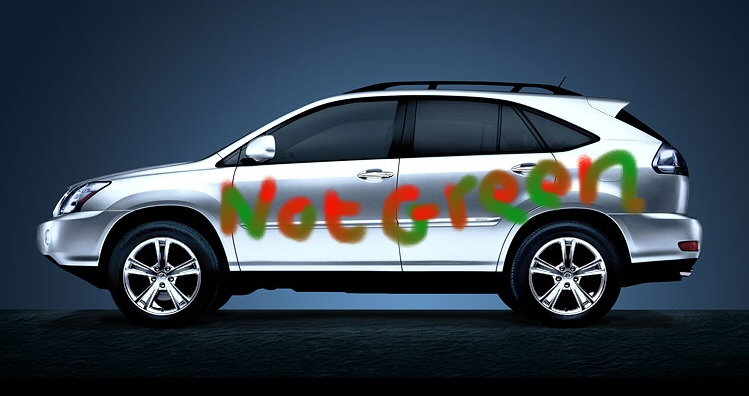Having been banned from saying their new hybrid is 100% Guilt Free, Lexus are now claiming you can live a Lexus Life, and still be green. This has to be seen to be believed.

One advertisement that infuriated me more than almost any other in the last year (and there are SO many to choose from), was that for the Lexus RX Hybrid. At the time I first saw it, green was not the colour in my mind — more a sort of splashy, angry red — and I decided to write about it.
Now, with the advert having been unceremoniously banned for – quite frankly — lying, Lexus have turned to Saatchi & Saatchi, the ailing but global ad agency, who have decided that a world without “h” is a terrible world. Obviously this needs explaining, so here’s the official guff:
“The TV commercial presents a glimpse into a world without h. The h is missing from key landmarks, computer keyboards and the alphabet in schools. The viewer begins to wonder where the h has gone. Then they see, it has moved to a better place, a world with the Lexus hybrid—a place that looks forward and believes in change. There is no better place for an h to be than on the rear badging of a Lexus hybrid vehicle.”
Run that past me again. Lexus have stolen all the “h”s, screwing the world’s keyboards and schools because they want to look good. Talk about honesty in advertising!
Perhaps this isn’t quite what they meant to get over, but hey, that’s what you get for trying to be clever.
At the same time Lexus have launched something called Lexus Living which is, quite frankly, hilarious. They have a big list of tips to make you a more hybridized greener person. Some of them just have to be listed (with a comment or two):
- Install a tankless hot water heater, and you’ll never run out of hot water (great, we can burn gas forever)
- Set your sprinklers to water at night. This saves water because there is less evaporation (or maybe, not use sprinklers)
- Keep a canvas bag in your car so you’ll have it handy when you go grocery shopping (making sure you always drive to the shops)
- Dimmer switches use less electricity, and the light is often more flattering (no they don’t. Dimmer switches are transformers, and they prevent the use of low energy lightbulbs)
etc…
What they are really saying is that rich people can carry on their rich lifestyle (they suggest you tell your gardener to use a broom rather than a hose : what, to stick up his arse and do a dance for you?) and still feel good while they are screwing the planet.

 Homepage:
Homepage:

Comments
Hide the following 4 comments
Dimmer switches
13.03.2008 10:33
[1]
[2]
[3]
Danny
Strepsil
13.03.2008 22:29
Rheostats
Domestic DC
14.03.2008 14:44
Since I was pedantic telling Keith I can't complain when you correct me. Using a current clamp I really can't see a big difference between my ancient dmmer switch at high and my dimmer switch at low. Mind you I've not opened it up to check the circuitry it contains nor have I ever calibrated my clamp which perhaps deserves it's [FOR INDICTATION PURPOSES ONLY] sticker that is dated '91. All of my posts should carry that sticker though. You never pulled me up about my line '12v superbright LED lighting' when most LEDs aren't 12V and most techies wanting to be pedantic would have, so I'm guessing you know this is an arguable point. Assuming Keith doesn't though I'll expand on that since it may be of more interest than the relative flaws of soon-to-be-extinct dimmer switches. Feel free to correct me.
12v LEDs are currently more expensive to buy than 5v ones, but they aren't any more expensive to produce nor is there any difference in luminescence. Most domestic DC systems run at 12v, mainly due to the historical prevalence of car batteries. Better designs supply 24 v (+12v and -12v) as this powers a wider range of equipment with less components Stepping up and down DC voltages requires small amounts of inexpensive circuitry, which isn't a factor for any small scale project, but does make a sizablee difference in mass-production costs. So if anyone is setting up a microgenerator such as solar I'd recommend 24v cells with 12vdc LEDs. Three wires, minimal components, more existing equiment provided for.
Danny
Oh
14.03.2008 18:33
Strepsil